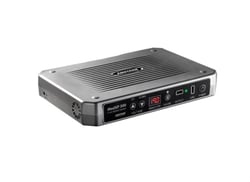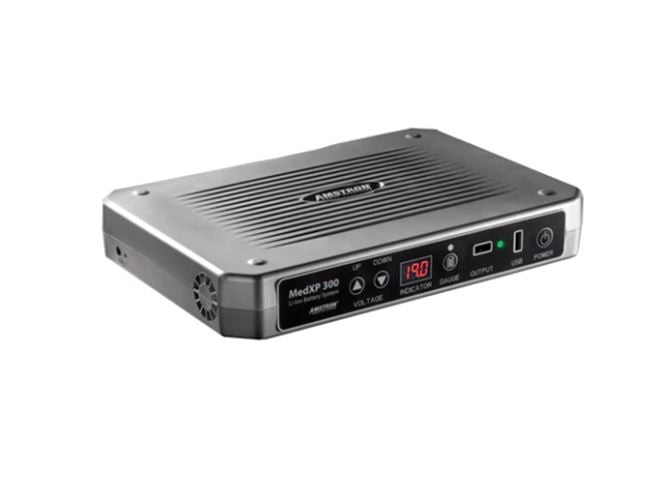By First Products on 8/3/21 10:54 AM
Wireless technology is reinventing medical care for both patients and providers.
But the lack of a reliable external power supply can quickly render even the most state-of-the-art tech absolutely useless. This is especially true for mobile medical carts and workstations that lack access to a functioning electrical outlet or when the use of a standard power cord would prove impractical.
The Benefits of Battery-Powered Medical Carts & Workstations
Obviously, any medical cart utilizing a device that requires a constant stream of electricity (such as a CPU-Monitoring Cart) will need a battery or other external power supply to ensure continued operation. And while tablet and laptop carts don’t necessarily require an external power supply, there are enormous benefits to having a battery at the ready.

For one thing, the addition of a battery will significantly enhance a caregiver's experience with a cart by increasing the uptime of mobile computers, portable diagnostic, and monitoring devices used with the unit. A battery-powered cart is impervious to power outages and eliminates the hazards of power cords cluttering hallways, patient rooms, and exam rooms.
The absence of a cumbersome electrical cord also makes a mobile cart or workstation far easier to maneuver around a medical office or healthcare facility.
What to Think About When Choosing a Medical Cart Battery
When selecting batteries to power your mobile medical carts and workstations, consider the following:
- Redundant Backup: A redundant backup feature enables the use of multiple batteries simultaneously in the event the power supply is compromised in some way.
- Power requirements: To ensure the most efficient use of power, select batteries that meet the wattage requirements of your carts.
- Battery weight: Rechargeable and lightweight batteries (no more than 15lbs) lessen the strain on staff.
- Safe design: Batteries should be easy to use and replace, have no visible wires, and be fully protected from leaks and seepage.
Lithium-Ion vs. Lead Acid Batteries
 Lithium-ion and lead-acid batteries currently dominate the medical cart market.
Lithium-ion and lead-acid batteries currently dominate the medical cart market.
As the oldest rechargeable batteries available, lead-acid batteries are generally less expensive than lithium-ion. However, they don't last as long, and their low energy density means that they’re significantly heavier than their lithium counterparts. Lead-acid batteries also take longer to charge (between 8 and 16 hours), must be stored fully charged, and aren’t environmentally friendly.
Lithium-ion batteries power everything from digital cameras, laptops, and cell phones to electric and hybrid cars. Though more expensive than lead-acid products, lithium-ion batteries are generally a better investment because they last longer. They’re also significantly smaller and weigh far less.
Rechargeable Medical Carts vs. Battery-Swapping Tech
 Battery-swapping technology is a good choice for hospitals, nursing homes, and other healthcare facilities that typically utilize mobile medical carts and workstations 24-hours per day, seven days per week. As the name implies, these options allow providers to simply switch out batteries, reducing the downtime associated with recharging.
Battery-swapping technology is a good choice for hospitals, nursing homes, and other healthcare facilities that typically utilize mobile medical carts and workstations 24-hours per day, seven days per week. As the name implies, these options allow providers to simply switch out batteries, reducing the downtime associated with recharging.
Battery-swapping tech also:
- Is an ideal option for facilities that lack the required infrastructure for charging of all carts.
- Eliminates the need for space to charge batteries or store drained and unusable carts.
- Saves employees the time and physical effort to plug and unplug cords, frequently the cause of the back (spinal) injuries reported in many worker’s compensation claims.
Rechargeable medical carts and mobile workstations require that the unit be exchanged for a fresh cart after a specific length of time to allow the battery to recharge. Periodic Automatic Replenishment (PAR) will alert users when it is time to switch out the cart.
Perfect-Fit Battery Options from First Products
First HealthCare Products works one-on-one with our clients to create custom medical carts and mobile workstations with fully integrated, perfect-fit power solutions.
Our offerings include the MEDXP-300 Version 3 external battery, which uses advanced lithium-ion technology to provide 10-15 hours of runtime for laptops, medical devices, and other electronics. A standard permanent battery, the MEDXP-300 can be mounted on a cart to serve as a "stationary" power source for other devices.
The Medical Grade Amstron MEDXP-160 Version 2 external battery features advanced lithium-ion polymer technology to power laptops, medical devices, and other electronics that require maximum power between charges. Depending on the application, the MEDXP-160 provides up to 11 hours of run time.
Contact First Products Today
First HealthCare Product’s unequalled commitment to customer service, seasoned sales support staff, dedication to long-term customer satisfaction, and industry best warranties have earned us the trust and respect of medical providers and healthcare facilities across the United States and worldwide.

To learn more about our perfect-fit power supply solutions for mobile medical carts and workstations, please contact First HealthCare Products today at 800.854.8304 and arrange for your Complimentary Demo.
_11wX8.5h-FINAL.png?width=721&name=FP-Logo-Horizontal-(COLOR)_11wX8.5h-FINAL.png)


comments